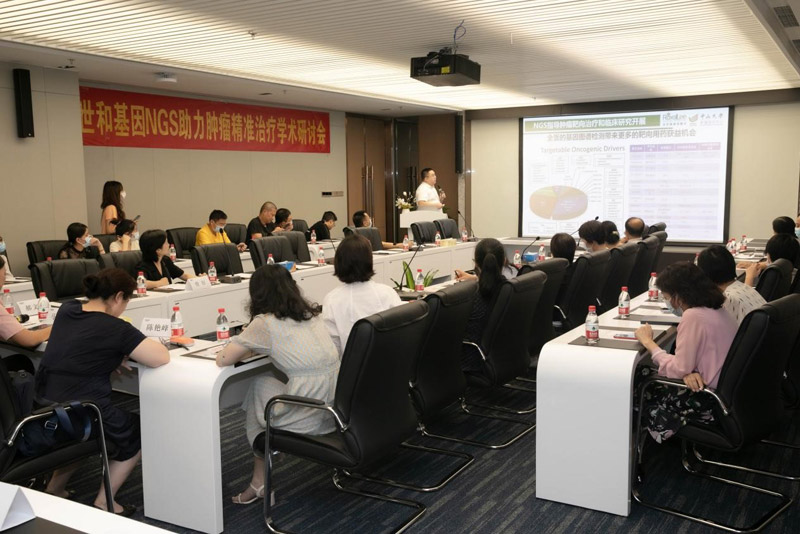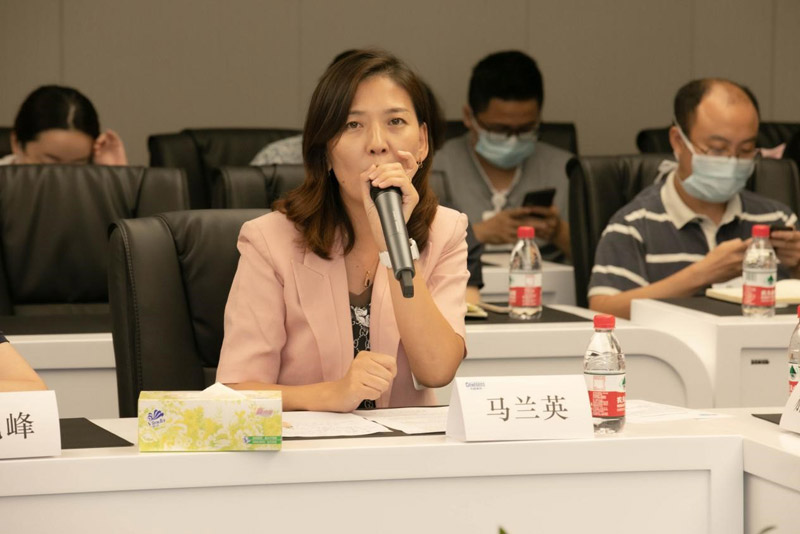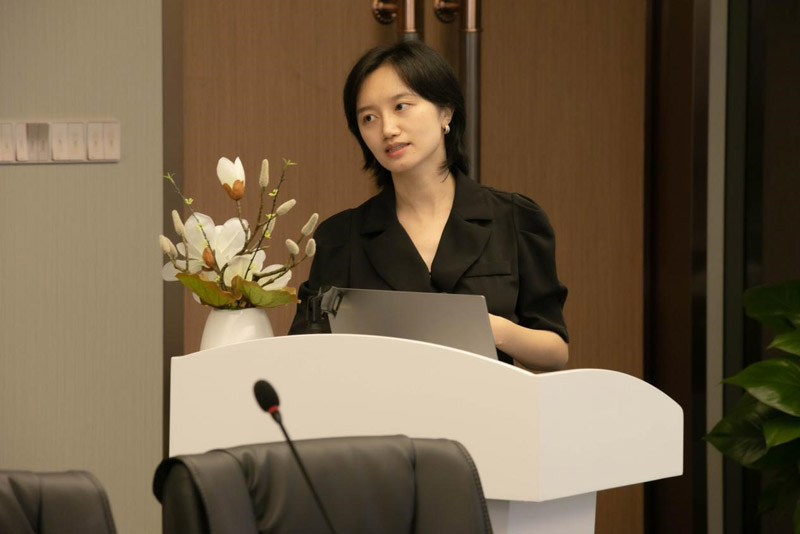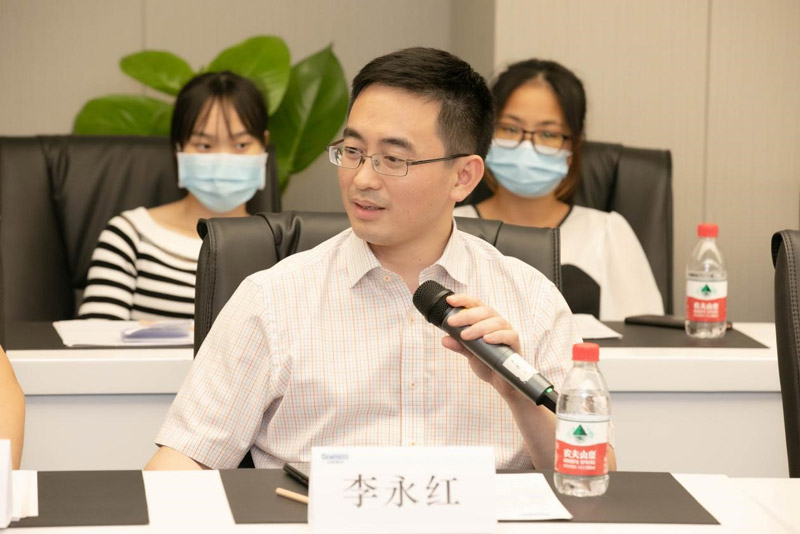In the fruitful month of September, blow the trumpet for victory, move forward with forceful stride. In order to boost the rapid development of tumor prevention and treatment in the Guangdong-Hong Kong-Macao Greater Bay Area, and to follow the instructions issued by the state on tumor prevention and treatment, on the afternoon of September 23, 2021, the 2nd Guangzhou Eastern Cancer Summit Forum and Oncology Multidisciplinary Academic Exchange Salon (Guangzhou Royallee Cancer Center & Sun Yat-sen University Cancer Center), sponsored by Guangzhou Royallee Cancer Center (Sun Yat-sen University International Health Medical Research Center), co-organized by Sun Yat-sen University Cancer Center, the Head and Neck Cancer Branch of Guangdong Precision Medicine Application Association, the Urogenital Tumor Committee of Guangdong Anti-cancer Association, the Chemotherapy Committee of Guangdong Anti-cancer Association, the Pain Branch of Guangdong Medical Association and Nanjing Geneseeq Biotechnology Co., Ltd. (hereinafter referred to as Geneseeq), was held in the conference center of Guangzhou Royallee Cancer Center.

Centering on the “Application of new technology in tumor precision treatment in the new era”, this conference carried out academic exchanges and in-depth academic discussions on tumor NGS panoramic gene sequencing, tumor immunotherapy, tumor targeted therapy, tumor precision surgical treatment, tumor precision internal medicine treatment, tumor precision palliative therapy, as well as research progress of Geneseeq in solid tumors and hematological tumors by multiple detection methods.
Those who attended the forum included Prof. Ma Lanying (Director of Palliative Medicine Center, Director of Oncology Department in Guangzhou Royallee Cancer Center), Prof. Chen Yanfeng, Prof. Hao Wenwen, Prof. Li Yonghong, nursing expert Chen Lihui, together with heads and office personnel of Pharmacy Department, Laboratory Department, Pathology Department, Medical Department and Administrative Office of Guangzhou Royallee Cancer Center. Duan Jianhua, the deputy director of Guangzhou Municipal Health Commission, Prof. Hou Jinlin, the vice chairman of Asia-Pacific Society of Hepatology, Sun Binggang, the executive vice president of Guangdong Precision Medicine Application Association, Prof. Zhang Quan, the chairman of the Head and Neck Cancer Branch of the Guangdong Precision Medicine Association, Prof. Weng Desheng, the chairman of the Rare Tumor Branch of the Guangdong Precision Medicine Association, together with Mr. Li Min, the chairman of Guangzhou Royallee Cancer Center and Prof. Wang Jichen, the director of Guangzhou Royallee Cancer Center sent their congratulation on the success of the symposium.
The forum started with a speech by Prof. Ma Lanying, the executive chairman of Guangzhou Royallee Cancer Center: as the cooperative unit of Sun Yat-sen Cancer Center, the leading unit of Sun Yat-sen International Health Medical Research Center and Guangzhou Eastern Caner Prevention and Treatment Institution, the backbone of Guangdong-Hong Kong-Macao Greater Bay Area tumor prevention and treatment institution, Guangzhou Royallee Cancer Center carries out multi-disciplinary and multi-level interactive exchanges in the fields of tumor clinic and fundamental research on tumor with Sun Yat-sen Cancer Center the top caner center in China, which is conducive to improving the overall medical technology level of Guangzhou Royallee Cancer Center, so as to explore and realize the multi-site, multi-skill and multi-expert model of cancer treatment for more patients in the Guangdong-Hong Kong-Macao Greater Bay Area.

Commissioned by Prof. Wang Jian, the head of the Palliative Care Center of the Guangzhou Royallee Cancer Center, Prof. Ma Lanying introduced the development of “Tumor Palliative Medicine Center”, a featured department of Guangzhou Royallee Cancer Center, to attendees.
The concept of “tumor palliative therapy” not only covers the comprehensive care and treatment of “physical, mental, social and spiritual” for cancer patients and their families, but also highlights the Chinese culture of respect and care for the sick and the weak, reflecting the concept of “patient-centered” humanistic care.
Guangzhou Royallee Cancer Center, standing at the forefront of foreign exchanges in the Guangdong-Hong Kong-Macao Greater Bay Area, offers a glimpse of China’s high-end tumor treatment to the outside world, and leads the way in promoting advanced diagnosis and treatment technology with along the Belt and Road. From the perspective of disciplinary development, the rapid development of the Palliative Medicine Center of Guangzhou Royallee Cancer Center has gone beyound the status quo of tumor palliative therapy, and emerged as a pioneer in new tumor treatment in combination with comprehensive tumor therapy and palliative therapy, a guardian of the life quality of cancer patients and a practitioner of respect for patients. It actively helps tumor patients to release pain, which has won the recognition of the majority of tumor patients and the professionals working on specialty construction in the same industry.
Fellow by Prof. Ma Lanying, Zeng Hao, manager of the Medical Research Department, interpreted the latest academic achievements of Geneseeq, including hundreds of clinical studies with many top domestic tumor centers such as Cancer Hospital Chinese Academy of Medical Sciences, Fudan University Zhongshan Hospital and Sun Yat-sen Cancer Center. A number of achievements have been made in solid tumors such as lymphoma, gastric cancer, colorectal cancer, liver cancer, breast cancer, and lung cancer, as well as hematological tumors such as lymphoma and multiple myeloma. The precise detection package provides high-quality clinical services for more tumor patients.

Then Prof. Hao Wenwen, a young scholar of Sun Yat-sen Cancer Center and the Guangdong outstanding medical talent, introduced the application of NGS sequencing technology in tumor precision medicine, and the tumor targeted therapy that are currently widely used in clinical practice. She mentioned that NGS sequencing has become an indispensable part of tumor precision treatment, which provides guidance for the diagnosis and treatment of rare tumors, and more medication evidence for the treatment of recurring common tumors. In addition, panoramic gene sequencing technology is strongly recommended for tumor patients with a relatively high degree of malignancy to deliver more desirable outcome, because the gene expression of such patients often presents diversity and heterogeneity. At the same time, it can also dynamically monitor tumor markers to detect tumor drug resistance and new tumor mutations in time, providing a reliable basis for the subsequent treatment of tumor patients.

Prof. Chen Yanfeng from the Head and Neck Department of Sun Yat-sen Cancer Center, Prof. Li Yonghong from the Urological Oncology of Sun Yat-sen Cancer Center, and head nurse Chen Lihui from Sun Yat-sen Cancer Center were also participated in the academic discussion, and they agreed that NGS sequencing technology has become an important basis for the diagnosis and treatment of solid tumors and hematological tumors, but its detection channel design and dynamic detection still need to be improved, and more oncologists, pharmaceutical R&D institutions and pharmaceutical enterprises need to participate in the research design of its clinical application scope. By developing a more precise NGS sequencing platform and channel, it can better help the development of tumor precision medicine and improve the life cycle and treatment effect of tumor patients.

Prof. Ma Lanying made a conclusion: the wonderful lectures of the speakers won the praise of the guests and the audience. The professional attitudes and outstanding knowledge of the participating experts have benefited us a lot and provided a better reference for the future cancer treatment. We look forward to more tumor academic exchanges will be successfully carried out in the future, which will bring stronger development assistance to Guangzhou Royallee Cancer Center.
With the strong support of a number of domestic oncology experts and the interpretation of the latest achievements of tumor NGS sequencing technology, the comprehensive ability of Guangzhou Royallee Cancer Center for individualized precision treatment has been further improved. At the same time, it strengthens the development of oncology specialty , especially tumor palliative care center It aims to improve the academic status of the center in the region and even the whole country, and take the correct development path in combination with production, education and research. Move forward without forgetting the initial aspiration, practice the mission and dedicate the sincerity. Guangzhou Royallee Cancer Center actively practices the hospital culture of patient-centered, makes continuous progress on tumor precision treatment and becomes a guardian of life.






